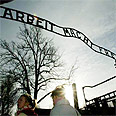
Poland must right the wrongs
צילום: איי פי
Poland must deal with its past
Stolen property must be returned to Holocaust survivors and their heirs
My childhood was full of magical, well known tales, about characters like Tevye the Milkman, as well as tales of love and joy and everyday life in the shtetls of Poland, told with warmth and wit by my grandparents. There were Moyshe and Sorale and Feygele from the shtetl of Zamosc; people I never met, but who were brought to life through my grandparent’s stories.
Some of them became my childhood heroes. As a little boy yet unaware of Auschwitz, I wondered about my grandmother’s sadness: Even when telling funny stories, she seemed to laugh with one eye and cry with the other. I don’t remember when I found out that all characters, so alive in these vivid stories, were murdered in Auschwitz.
In recent years I have had several opportunities to visit former Polish shtetls, including the town of Zamosc where my grandmother’s family lived before the Holocaust. These villages are places where Jewish memory has been turned into history.
On a one-lane street leading to a small house on Ulica Gesia in Zamosc, I found the house where the Zalcman family once lived. It was from this house that my relatives Moshe, Henale and Avrum Zalcman were deported to the death camp of Belzec, just a few dozen kilometers away, in July 1942.
Nothing left
There are no Jews in Zamosc today. No sign of a once-thriving Jewish life is present. The only memories left of Tevye the Milkman, Feter Moyshe and my own family’s legacy are their properties, and the property of thousands of other Jews that was seized by the Nazis during World War II and nationalized by the Polish Communist government after the war.
It is estimated that there are currently over 170,000 private properties held in Poland that were wrongfully seized from Jewish victims of the Holocaust and communist terror. These properties have an estimated value of billions of dollars, according to a comprehensive report recently drawn up by experts from the business sector, non-profit and non-governmental organizations at the request of the Israeli government.
60 years after the end of World War II and the liberation of the extermination camps, no viable solution has been found to resolve this critical issue.
Moral force
Poland was one of the main victims of Nazi Germany, and six million of its citizens - half of them Jews - were murdered by the Germans. Since regaining its independence in 1989, joining NATO and entering the European Union, Poland has established itself as a model for free and democratic states in Eastern Europe and throughout the world.
Poland's reputation as a force for moral good would be made greater by reaching a just settlement, acceptable to all parties, on the issue of restitution of private property seized from Polish Jews.
The Polish Parliament could take an important step in this direction by passing comprehensive legislation providing for the complete restitution of assets stolen by the Nazis and the communist government. The advanced age of remaining Holocaust survivors makes the matter all the more urgent and the need to act all the more pressing.
Clear standards
The international standards are clear. The overriding principle that emerged in the immediate post-war period in Western Europe and was enacted in allied decrees and legislation that has continued to this day (see the recent German Property Law 1990) is that property that was taken from Jewish owners and heirs must be returned, with interest, to their former Jewish owners. A wrong was committed. The wrong must be remedied.
The European Convention of Human Rights (1953), which the Republic of Poland has ratified, states that "Every natural or legal person is entitled to the peaceful enjoyment of his possessions" (Article 1). The convention makes it absolutely clear that "no one shall be deprived of his possessions except in the public interest and subject to the conditions provided for by law and by the general principles of international law.”
The Organization for Security and Cooperation in Europe (OSCE) has also consistently advocated that its member states deal with restitution of property stolen by the Nazis in a comprehensive and non-discriminatory way. During its 10th Parliamentary Session in 2001, the OSCE adopted a resolution urging member states “to ensure that they have implemented appropriate legislation to secure the restitution and/or compensation for property loss by victims of Nazi persecution…to Nazi victims or their heir(s) irrespective of their current citizenship or place of residence.”
The remaining ghosts of the past must be fought and old offences must be compensated. It is high time we honor the memory of those who were murdered during the Nazi tyranny, and bring justice to the survivors and their heirs by rectifying the wrongful expropriations of property by the Nazi and communist regimes.
By intensifying our efforts to return the confiscated properties to their rightful owners and by honoring the memory of the past, we safeguard the fundamental principles of tolerance, freedom and democracy – and help ensure that no child in the future will have to learn his childhood heroes were annihilated.
Daniel Schatz is a political scientist and Swedish Candidate for Parliament










